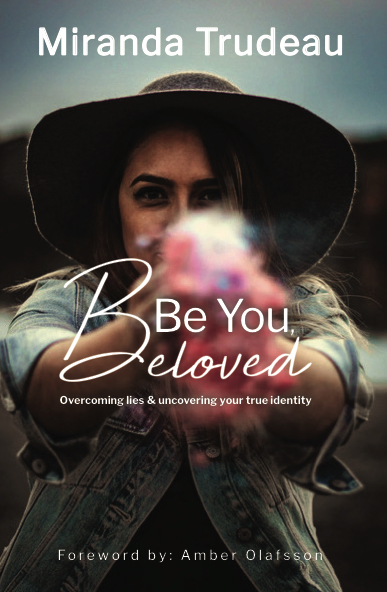
Excerpt from Be You, Beloved by Miranda Trudeau, Chapter 1: What they said
As children, our view of who we are is shaped by what those around us say. Those influential adults who’ve spoken about life, those mean kids at school whose words stung, that cute girl or boy in class whose every word we clung to. All of these different people spoke into who we believed we were as children, and we often carry these messages about our identity into our adulthood. Parents especially have an important role in this. Whether you had a healthy relationship with your parents and they spoke positively into your life or a negative relationship that was filled with shame, condemnation, and insults, every word they said rests deep in your heart and sits at your core.
I remember I was on the bus once, and these kids started making fun of my glasses. As a child, these moments seem like the end of the world, right? I got glasses in fourth grade, and while getting braces seemed cool, getting glasses seemed dorky. I was labeled from an early age by something so simple and medically necessary, but it changed my perspective of myself for a long time. I was convinced through most of my schooling years that I could never be cool because I had glasses. It wasn’t until I was about ready to graduate high school that I was able to get contacts, so for many years, I personally experienced the effect that others’ words can have on you.
As we get older, the list of who takes a spot in the judgment seat expands. Teachers, professors, bosses, current friends, ex-friends, ex-boyfriends or girlfriends, the barista at the coffee shop, neighbors, grandmas, grandpas, pastors, the list goes on and on. Even now, there are voices constantly coming at us on a daily basis, and if we don’t learn to manage the volume we allow those voices to have, we will be left with our heads spinning and our hearts hurting.
Figuring out who we believe we are is crucial to evaluating our relationships and learning what healthiness looks like in action – and this starts with looking back at our childhood. This type of reflection will help us understand not only what formed our opinions of ourselves from the beginning, but also how we acted in situations as a young person. Ultimately, our expressions of ourselves reflect what we think about ourselves.
Our expressions of ourselves reflect what we think about ourselves.
Let me be clear, just because we think something about ourselves does not mean it’s truth. Feelings and truth are two separate things, and we have to realize this as we proceed forward. Feeling like you are incapable of something doesn’t absolve the truth that you are created for greatness, that you are created to be powerful, and that you are capable of achieving. Rather than setting up camp in what we think about ourselves, we can find strength to walk through the lies and step into our true identities in Christ, as we learn to recognize when our feelings are saying something different than what He says about us.
As we walked through childhood, there were so many voices around us. These don’t decrease as we get older, and I am sure you could come up with at least ten voices who speak into your life on a consistent basis. What would it look like if we lived with authority and power to turn down those voices? Think about this for a second—we have the ability, the responsibility, and the right to choose who speaks identity to us. No one steals that seat; WE get to invite them in because ultimately, we can decide where we find our identity. It is so necessary that we take control over this portion of our lives.
I don’t know your story or what type of voices you had speaking into your life. I had a mix—some people spoke positive things, but there were many other voices that I allowed to speak freely in their negativity. From the teacher who declared I would never be able to take a test successfully, to the leader who said I would never be good enough to help. These negative words, along with many others, planted seeds in my heart and developed roots that spread so deep that many of them still rest there. I was hurting; I was broken, and it took me a long time to heal from the labels that had been tattooed on my heart. For so long, my past experiences were a huge roadblock in ever discovering the “more” that God had planned for me, and it definitely delayed me from really coming into partnership with who He says I am. I sat in brokenness, not really expecting that change would come, but hoping and believing in my heart that it would happen all at once, unexpectedly, without any work on my part. I quickly learned otherwise, realizing that my actions were as much needed as my open heart, and I came to learn that with work and effort, I could uncover the lies of the enemy about my identity and really step into my God-given identity. It was a journey that I am so glad I took and one I hope to take you on throughout this book.

Be You, Beloved is available via preorder now at Miranda’s site, where you can also purchase a coordinating journal: https://www.mirandatrudeau.com/shop/beyoubeloved
You can also preorder at Amazon & Barnes and Noble & Books A Million to have it arrive on or around release day!
Be You, Beloved: Overcoming lies & uncovering your true identity releases June 18th, 2019
Looking to do this study with a group of friends? Be You, Beloved is available for group discounts by emailing orders@unitedhousepublishing.com

Miranda Trudeau is the author of Be You, Beloved and a wife who has a passion to see people become the best version of themselves. After growing up in the church, Miranda went on to become involved in leadership for both children’s and youth ministry at a local church, where these moments defined her passion to see everyone, especially teens, discover their true identity in Christ. You can learn more about her and stay up to date on her next release, at mirandatrudeau.com.
Leave a Reply